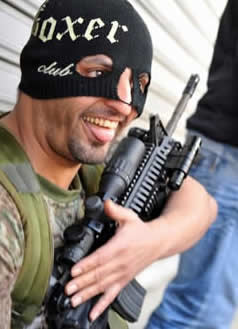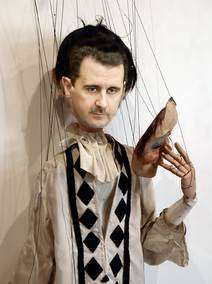After seeing a significant erosion of Syrian influence in Beirut, underscored by the recent Syrian military withdrawal from Lebanon, Iranian leaders are working vigorously to preserve Tehran's geopolitical position in the Middle East. In recent weeks there has been an upsurge in talks involving officials from Iran, Syria and Lebanon. On April 20, for example, Lebanese Prime Minister Najib Mikati met with the Iranian ambassador to Beirut, Masud Edrisi, to discuss the future of Lebanese Hezbollah, IRNA reported. The official Iranian news agency suggested that Iran would accept the Lebanese people's decision concerning Hezbollah's fate. Several days prior to the Mikati-Edrisi meeting, news that Iran had withdrawn most of the estimated 2,000 Revolutionary Guards in Lebanon began to circulate. Tehran had never formally acknowledged the Revolutionary Guards' presence.
Hezbollah is a militant Shi'a organization, designated by the United States as a terrorist group, set up by Iran's Islamic Revolutionary Guards Corps in 1982. It remains unclear whether Hezbollah will seek to legitimize its activities and participate in Lebanon's political process, or retain its militant character. Iran as come under increasing international pressure to help promote Hezbollah's disarmament. What is more certain is Iranian officials want to bolster the electoral chances of Lebanese Shi'as when parliamentary elections are held in Lebanon starting May 29. Up to 40 percent of Lebanon's population is Shi'a Muslim.
In late April, Iranian President Mohammed Khatami held meetings with prominent Lebanese political figures, including Sheik Abdel Amir Qabalan, deputy head of Lebanon's Supreme Shiite Council, and Walid Jumblatt, the leader of Lebanon's Druze community. Following the meeting with Jumblatt, Khatami warned of the possibility of civil war in Lebanon. He also expressed concern that the upcoming elections could escalate tension among various interest groups in Lebanon, adding that upheaval in Syria, an Iranian ally, would "a catastrophe for the region," the Iran Students' News Agency reported April 24.
The February 14 assassination of former Lebanese prime minister Rafiq Hariri forced Iranian leaders to re-evaluate their regional policies. Hariri's death set of the chain of events that led to Syria's military withdrawal, completed on April 26. As Syrian troops departed Lebanon, officials in Damascus and Tehran maintained close contacts. Following a Syrian-Iranian diplomatic meeting in early April, for example, Iranian Foreign Minister Kamal Kharazzi noted the "importance of maintaining the security, stability and civil peace that Lebanon has known" since the 1989 pact that ended the Lebanese civil war.
While much of the international community saw a Syrian hand in Hariri's murder, the prevailing view in Iran held that the United States was responsible. Official Iranian statements indicated that Hariri had been targeted by Washington, and its closest regional ally, Israel, as part of the US effort to reshape the political map of the Middle East.
Some political observers believe that recent events in Lebanon have served to strengthen Iranian and Syrian cooperation. In a February 16 statement, Iranian Vice President Mohammed Reza Aref noted that "Syria and Iran face several challenges," going on to suggest the establishment of a "common front." Other analysts, though, suggest the ties that bind Iran and Syria may be loosening, rather than becoming tighter.
Syria was the only Arab state that sided with Iran during the latter's war with Iraq during the 1980s. However, the ouster of Iraqi dictator Saddam Hussein removed the common foe that had originally brought Tehran and Damascus together. The erosion of Syrian influence in Lebanon could cause Tehran to effectively write off its partnership with Damascus.
"Iran will not give Syria wholehearted support ... precisely because its alliance with Damascus is built around cold calculation rather than ideological fervor," Iason Athanasiadis wrote in a commentary published April 29 by the Daily Star, a Lebanese English-language newspaper. "Sending material support to Syria - or for that matter to Hezbollah now that the Syrians have completed their withdrawal from Lebanon -- would over-extend Iran at a time when the US military is camped to its east, west and north, in Afghanistan, Iraq and in several former Soviet republics."
There are voices in Iran that have been openly critical of some of Syria's latest political moves. Some Iranian analysts now believe that Syria might opt to make peace with Israel if a solution can be found to the Golan Heights issue. That would leave Iran further in the cold in the delicate balance of power of the Middle East. Accordingly, the sentiment in Iran is that relations with Syria are far more dispensable than that with Hezbollah.
Hezbollah is after all a brainchild of the Iranian Islamic Revolution. The problem for Tehran is that the fate of Hezbollah can be seen as closely connected to that of Bashar Assad's Syria. Syria's fading position in Lebanon leaves Tehran little option but to court its natural Shi'a allies in that country more vigorously. |
 Vice-president of the Higher Shiite Council Sheikh Abdel-Amir Qabalan said in comments published on Monday that as long as the Palestinian cause was not resolved, the Resistance [Hezbollah] and the Lebanese army "will work hand in hand." He stressed that the Resistance "will not to create a separate state or have arms of its own."
Vice-president of the Higher Shiite Council Sheikh Abdel-Amir Qabalan said in comments published on Monday that as long as the Palestinian cause was not resolved, the Resistance [Hezbollah] and the Lebanese army "will work hand in hand." He stressed that the Resistance "will not to create a separate state or have arms of its own." 
 The now infamous Syrian witness
The now infamous Syrian witness  Senior Shiite cleric
Senior Shiite cleric